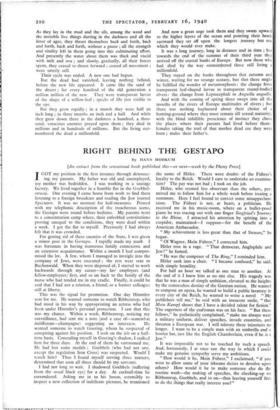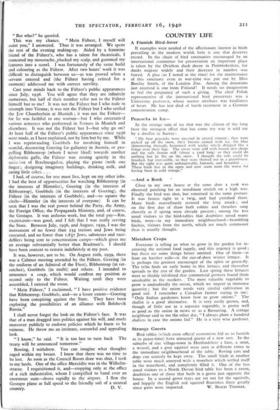RIGHT BEHIND THE GESTAPO
By HANS HOHKUM
[An extract from the sensational book published this—or next—week by the Phony Press] IGOT my position in the first instance through denounc:- 1 ing my parents. My father was old and unemployed, any mother was bedridden. I was working in a sausage factory. We lived together in a humble flat in the G oebbel- strasse. One evening I came home from work to find them listening to a foreign broadcast and reading the Jew journal Spectator. It was no moment for half-measures. Primed with my telephonic description of the treacherous scene, the Gestapo were round before bedtime. My parents went to a concentration camp where, their enfeebled constitutions proving unequal to the conditions, they were dead within a week. I got the flat to myself. Previously I had always felt that it was crowded.
For getting rid of these enemies of the State, I was given a minor post in the Gestapo. I rapidly made my mark. I was fortunate in having numerous family connexions and an extensive acquaintance. Within a month I had compro- mised the lot. A few, whom I managed to inveigle into the company of Jews, were executed ; the rest were sent to Buchenwald. When they were disposed of, I started to work backwards through my career—my last employers (and fellow-employees) first, and so on back to the family of the nurse who had tended me in my cradle. Finally, it could be said that I had not a relation, a friend, or a former colleague still at liberty.
This was the signal for promotion. One day Himmler sent for me. He wanted someone to watch Ribbentrop, who had stood in his way by appropriating an actress who had been under Himmler's personal protection. I saw that this was my chance. Within a week, Ribbentrop, noticing my surveillance, had sent me a note (and a case of—somewhat indifferent—champagne) suggesting an interview. He wanted someone to watch Goering, whom he suspected of conspiring against his position. I took on the job on a half- time basis. Concealing myself in Goering's shadow, I stalked him for three days. At the end of them he summoned me. He had lost some medals ; Goebbels (who had not any, except the regulation Iron Cross) was suspected. Would I watch him? Thus I found myself serving three masters, determined that soon all three should be my servants.
I had not long to wait. I shadowed Goebbels (suffering from the usual black eye) for a day. At cocktail-time he surrendered. Asking me in to his house, ostensibly to inspect a new collection of indelicate pictures, he mentioned the name of Hitler. There were doubts of the Fiihrer's loyalty to the Reich. Would I care to undertake an examina- tion? The pay was not bad ; I took on the job.
Hitler, who seemed less observant than the others, per- mitted me to follow him for a whole week before issuing a summons. Here I feel bound to correct some misapprehen- sions. The Fiihrer is not, at heart, a politician. He received me in his music-room, where on a bullet-proof piano he was tracing out with one finger Siegfried's Journey to the Rhine. I attracted his attention by spitting into a cuspidor, maintained—I suppose—for the benefit of the American Ambassador.
" My achievement is less great than that of Strauss," he began.
" Of Wagner, Mein Fiihrer," I corrected him.
Hitler rose in a rage. " That democrat, Anglophile and Jew!" he fumed.
" He was the composer of The Ring," I reminded him. Hitler sank into a chair. " I became confused," he said, with simple humility.
For half an hour we talked as one man to another. At the end of it I knew him as no one else. His tragedy was that he was a man of simple ambition, elevated to the heights by the remorseless destiny of the German nation. He wanted to compose an opera, he wanted to build a public lavatory in every city of the Reich, he wanted to write a novel. " My publishers tell me," he said with an innocent smile, " that Mein Kampf shows that I have a decided talent for fiction." The eagerness of the craftsman was on his face. " But these fellows," he pathetically complained, " make me always wear a military uniform, deliver speeches, invade countries, and threaten a European war. I will tolerate these injustices no longer. I want to be a simple man with an umbrella and a bowler hat, just like the English Chamberlain, even if he is a Jew."
It was impossible not to be touched by such a speech. And, fortunately, I at once saw the way in which I could make my genuine sympathy serve my ambitions. " How would it be, Mein Fuhrer," I exclaimed, " if you were to allow some of your irksome duties to devolve upon others? How would it be to make someone else do the routine work—the making of speeches, the checking-up on Ribbentrop, Goebbels, and so on—thus leaving yourself free to do the things that really interest you?" " But who?" he queried.
This was my chance. " Mein Fiihrer, I myself will assist you," I answered. Thus it was arranged. We spent the rest of the evening making-up. Aided by a feminine friend of the Fiihrer's, who has a talent for theatricals, I truncated my moustache, plucked my scalp, and gummed my features into a scowl. I was fortunately of the same build and colouring as the Fiihrer. After two hours' work it was difficult to distinguish between us—as was proved when a servant entered and (the Fiihrer having . retired for a moment) addressed me with correct servility.
Cast your minds back to the Fiihrer's public appearances since July, 1936. You will agree that they are infinitely numerous, but half of their number refer not to the Fiihrer himself but to me! It was not the Fiihrer but I who rode in triumph into Vienna; it was not the Fiihrer but I who settled the Jew Chamberlain at Munich ; it was not the Fiihrer- for he was faithful to one woman—but I who entertained various actresses who performed in Strauss in Munich and elsewhere. It was not the Fiihrer but I—but why go on? At least half of the Fiihrer's public appearances since 1936 were made, as I have explained, not by him but by me. While I was reprimanding Goebbels for involving himself in scandal, decorating Goering for gallantry in Austria, or pro- pelling Ribbentrop (whom I never liked) towards another diplomatic gaffe, the Fiihrer was resting quietly in the seclusion of Berchtesgade.n, playing the piano (with one finger), designing imaginary buildings, drinking milk, and eating little cakes. . . .
I had, of course, for one must live, kept on my other jobs. I had the best of opportunities for watching Ribbentrop (in the interests of Himmler), Goering (in the interests of Ribbentrop), Goebbels (in the interests of Goering), the Fiihrer (in the interests of Goebbels), and—to square the circle—Himmler (in the interests of everyone). It can be seen that I was the real power behind the Party, the Army, the Foreign Office, the Propaganda Ministry, and, of course, the Gestapo. It was arduous work, but the total pay—Rm. ro,000,000—was good, and I felt that I was really serving the State. Between July, 1936, and August, 1939, I was the instrument of no fewer than 234 traitors and Jews being executed, and no fewer than 1,837 Jews, saboteurs and race- defilers being sent to concentration camps—which gives me an average substantially better than Bradman's. I should have been content to remain indefinitely at my post.
It was, however, not to be. On August loth, 1939, there was a Cabinet meeting attended by the Fiihrer, Goering (in the uniform of an Admiral of the Fleet), Ribbentrop (in rat- catcher), Goebbels (in mufti) and others. I intended to announce a coup, which would confirm my position as second only to the Fiihrer. Waiting until they were assembled, I entered the room.
" Mein Fiihrer," I exclaimed, " I have positive evidence that Ribbentrop, Goebbels, and—to a lesser extent—Goering have been conspiring against the State. They have been exploring the possibilities of an affiance with Bolshevik Russia."
I shall never forget the look on the Fiihrer's face. It was that of a man dragged into politics against his will, and made moreover publicly to endorse policies which he knew to he ruinous. He threw me an intimate, sorrowful and appealing look.
" I know," he said. " It is too late to turn back. The treaty will be announced tomorrow."
Bowing, I withdrew. You can imagine what thoughts raged within my breast. I knew that there was no time to be lost. As soon as the Council Room door was shut, I took to my heels. One of the office Mercedes was in the Wilhelm- strasse. I requisitioned it, and—stopping only at the office of a rich industrialist, whom I compelled to hand over an enormous sum—drove rapidly to the airport. I flew the Gestapo plane at full speed to the friendly soil of a neutral







































 Previous page
Previous page